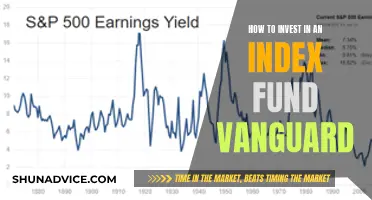
Money market funds are a type of mutual fund that invests in short-term, high-quality debt securities. These funds aim to provide investors with high liquidity and low risk while generating modest income through interest. Money market funds primarily invest in debt instruments issued by governments and corporations, including Treasury bills, commercial paper, and corporate bonds. While the funds do not aim for significant capital appreciation, they offer stable returns and are suitable for investors with short-term investment goals. It's important to note that money market funds are not insured or guaranteed and carry a degree of investment risk.
| Characteristics | Values |
|---|---|
| Risk | Low |
| Liquidity | High |
| Investment type | Mutual fund |
| Investment instruments | Debt securities, cash, cash equivalents |
| Investment duration | Short-term |
| Returns | Low |
| Tax status | Taxable or tax-exempt |
| Management | Professionally managed |
| Suitability | Short-term investment goals |
What You'll Learn

Money market funds are a type of mutual fund
Money market funds are a safe, stable investment option for money that may be needed in the short term. They are often used for emergency funds or short-term goals. These funds are different from money market accounts, which are typically offered by banks and credit unions and insured by the Federal Deposit Insurance Corporation (FDIC).
Money market funds invest in a range of low-risk, short-term debt instruments, including:
- Bankers' Acceptances (BA): Short-term debt guaranteed by a commercial bank
- Certificates of Deposit (CDs): Bank-issued savings certificates with short-term maturity
- Commercial paper: Unsecured short-term corporate debt
- Repurchase agreements (Repo): Short-term government securities
- U.S. Treasuries: Short-term government debt issues
Money market funds aim to maintain a net asset value (NAV) of $1 per share. They are popular for their stability and regular income generation, although they are sensitive to interest rate fluctuations.
Overall, money market funds are a conservative investment option, providing high liquidity and low risk for investors.
Mutual Fund Investment: Eligibility and Requirements
You may want to see also

They invest in short-term, low-risk debt securities
Money market funds are a type of mutual fund that invests in short-term, low-risk debt securities. These funds are designed to offer investors a high level of liquidity with a very low level of risk. They are ideal for those saving for short-term goals or building an emergency fund.
Money market funds primarily invest in highly liquid, short-term debt instruments, such as government-backed securities, cash, and cash equivalents. These include cash-equivalent securities and high-credit-rating, debt-based securities with short-term maturities, such as US Treasury bills. Money market funds also invest in short-term corporate debt, such as commercial paper.
The funds aim to maintain a stable $1 net asset value (NAV) per share, providing regular income in the form of dividend payments. While money market funds are considered low-risk, it's important to note that they are not insured by the Federal Deposit Insurance Corporation (FDIC) and are subject to market risks and potential loss of capital.
Compared to other investments, money market funds offer lower returns due to their liquidity. They are, however, a relatively safe investment option, especially during volatile times. Money market funds are a popular choice for investors seeking to temporarily park their money before investing elsewhere or making anticipated cash outlays.
In summary, money market funds are mutual funds that focus on short-term, low-risk debt securities. They provide investors with high liquidity, regular income, and stability, making them a preferred choice for short-term financial goals and emergency funds.
Setting Up an Investment Fund: A US Guide
You may want to see also

Money market funds are extremely low-risk
Money market funds are a type of mutual fund that invests in highly liquid, short-term instruments. These funds are considered extremely low-risk on the investment spectrum.
Money market funds invest in cash and cash equivalents, such as cash-equivalent securities and high-credit-rating, debt-based securities with short-term maturities (e.g., U.S. Treasuries). They are intended to offer investors high liquidity with a very low level of risk.
Money market funds are ideal for those seeking a safe, short-term investment option. These funds are also suitable for those who want to park their money temporarily before investing elsewhere or making an anticipated cash outlay.
The funds are regulated and aim to maintain a net asset value (NAV) of $1 per share. This requirement ensures regular income for investors and easy tracking of net gains.
While money market funds are generally considered low-risk, it's important to note that they are not suitable for long-term investment goals like retirement planning due to their low capital appreciation. Additionally, money market funds are not insured by the Federal Deposit Insurance Corporation (FDIC) and are subject to interest rate fluctuations.
In summary, money market funds are a type of mutual fund known for their low-risk nature, high liquidity, and short-term investment focus. They are a stable and secure option for investors seeking a temporary parking spot for their money or those looking to diversify their portfolio with conservative investments.
Index Funds vs. IRAs: Where Should You Invest?
You may want to see also

Money market funds are insured by the Securities Investor Protection Corporation (SIPC)
Money market funds are a type of mutual fund that invests in short-term, low-risk securities. They are insured by the Securities Investor Protection Corporation (SIPC), which provides protection for customers if their brokerage firm fails. This insurance is vital as it offers peace of mind to investors, ensuring their assets are safeguarded.
The SIPC is a non-profit corporation created by Congress 50 years ago to protect investors. It has been instrumental in restoring billions of dollars to investors when their brokerage firms fail financially. The SIPC logo on a brokerage firm's website signifies that customer assets are protected under the Securities Investor Protection Act (SIPA).
SIPC protection is limited to $500,000 per customer, with a maximum of $250,000 of that amount designated for cash within the customer's account. This cash protection is intended for funds not yet invested in securities. It is important to note that SIPC insurance does not cover investment losses, worthless stocks, or other securities.
Money market funds are considered extremely low-risk investments, and their insurance through the SIPC adds an extra layer of security for investors. This insurance coverage ensures that investors can recover their cash and securities in the rare event of a brokerage firm failure.
The SIPC protection is not the same as Federal Deposit Insurance Corporation (FDIC) insurance, which covers bank accounts. SIPC insurance specifically covers securities like stocks, bonds, mutual funds, and money market funds. This distinction is essential, as it clarifies the scope of protection provided by the SIPC for investors in money market funds.
Mutual Funds: Lump Sum Investing Strategies for Success
You may want to see also

Money market funds are not the same as money market accounts
Money market funds and money market accounts are two distinct financial tools with key differences. While both are considered safe and liquid investments, they differ in terms of risk level, return potential, accessibility, and regulatory oversight. Understanding these nuances is crucial for making informed financial decisions. Here are four to six paragraphs elaborating on the topic:
Money market funds are a type of mutual fund that invests in short-term, low-risk securities, such as treasury bills, corporate bonds, and commercial paper. They offer slightly higher returns than traditional savings accounts but are not federally insured. While they are relatively safe, there is no guarantee against loss, and investors bear the risk of potential fluctuations in the value of their investments. Money market funds are opened through brokerages, and investors need to research and purchase shares in these funds. These funds are suitable for those seeking higher returns than savings accounts but are willing to accept slightly higher risks and have a longer-term investment horizon.
On the other hand, money market accounts (MMAs) are interest-earning bank accounts that combine features of checking and savings accounts. They are FDIC-insured for banks or NCUA-insured for credit unions, providing coverage of up to $250,000 per depositor. MMAs generally offer higher interest rates than traditional savings accounts, making them attractive for those seeking higher returns. However, they usually come with transaction limits, typically restricting account holders to six withdrawals per month. Additionally, MMAs may have higher minimum balance requirements than traditional savings accounts, and failing to maintain this balance may result in service fees.
One of the key distinctions between money market funds and MMAs is accessibility. Money market funds do not offer immediate access to funds through debit cards or check-writing privileges. Investors need to initiate a transfer from their brokerage account, which may take one or more business days for the funds to become available. In contrast, MMAs often provide ATM cards, debit cards, or check-writing privileges, making it more convenient to access funds. This feature of MMAs is particularly valuable for emergency funds or short-term savings goals.
Another difference lies in the nature of returns. Money market funds derive their returns from the performance of the underlying investments held in the fund, minus the necessary management expenses. These returns are slightly higher than MMAs but are subject to market fluctuations. In contrast, MMAs offer a stated interest rate that varies among banks and credit unions, providing a more predictable return. Additionally, money market funds may have management fees, expressed as expense ratios, which impact the overall returns.
In summary, while both money market funds and MMAs serve as liquid, low-risk investment options, they cater to different needs. Money market funds are suitable for investors seeking higher returns, willing to accept slightly higher risks, and who don't require immediate access to their funds. On the other hand, MMAs are ideal for those who prioritize safety, liquidity, and competitive interest rates, especially for emergency funds or short-term savings goals.
Sector Fund Investment: Strategies for Success
You may want to see also
Frequently asked questions
Money market funds are a type of mutual fund that invests in low-risk, short-term debt securities, such as treasury bills, municipal debt, or corporate bonds. They are designed to offer a safe, stable investment option for money that may be needed in the short term.
Money market funds are considered to be one of the least volatile types of mutual fund investments. They offer liquidity, security, short duration, and diversification.
Unlike typical bank certificates of deposit (CDs) or savings accounts, money market funds are not insured by the Federal Deposit Insurance Corporation (FDIC). There is a risk that you could lose money, and there is no guarantee that you will receive $1 per share when you redeem your shares.







